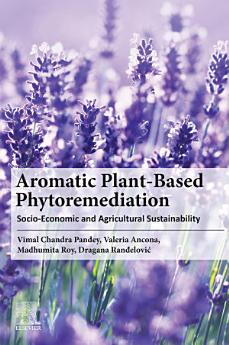Aromatic Plant-Based Phytoremediation: Socio-Economic and Agricultural Sustainability
Nov 2023 · Elsevier
Ebook
350
Pages
family_home
Eligible
info
reportRatings and reviews aren’t verified Learn More
About this ebook
Nutraceutical Fruits and Foods for Neurodegenerative Disorders presents food-based strategies, specifically related to nutraceuticals, in delaying the onset and slowing down of the propensity of neuronal devastation. In addition to highlighting the positive effects of nutraceutical fruits and foods on brain health, the book also explores the medicinal properties of fruits, vegetables, berries and nutraceuticals, along with their contribution to environmental factors, potential hazards and the need for specific regulatory actions. This book will be a welcomed reference for nutrition researchers, dieticians, nutritionists and academicians studying related fields. Users will find this book to be a solid foundation on which scientific knowledge in the field of aromatic crop-based phytoremediation can grow and expand. It will also be a good and instructive text with a format that is easy to grasp and read. - Focuses on anthropogenic land pollution and management through aromatic crops - Provides basic understanding and a clear picture on how to use aromatic grasses in phytoremediation with a goal toward sustainable development - Explores the sustainability of aromatic crop cultivation in polluted land in phytoremediation programs
About the author
Dr. Valeria Ancona graduated from the University of Bari with a degree in Agricultural Science and Technology in 2004. She earned her Ph.D. in Agricultural Chemistry from the same university in 2008. She was able to solidify her knowledge and abilities in soil and water remediation technologies because to the abundance of experience she gained throughout her Ph.D. phase. She has been working at the Waters Research Institute (IRSA-CNR) in Bari since 2008, focusing on plant-assisted bioremediation as an ecological approach to multi-contaminated site recovery. She combined microbial ecology techniques for evaluating the structure and composition of soil microbial communities with analytical techniques for the assessment of contaminants (organic and inorganic) in soil and biomass to study soil decontamination processes as a result of the synergistic action between plant species and soil microorganisms. More than 80 publications have been published in national and international scientific journals (ISI), conference proceedings, and technical reports because of her research.Dr. Madhumita Roy is a DST Women Scientist at the Bose Institute in Kolkata, where she is the Principal Investigator. Her previous work experience includes a postdoctoral fellowship at CSIR-IICB (2012-2013) and teaching at Techno India University's Biotechnology Department as an assistant professor (2014-2018). Jadavpur University awarded her a Ph.D. in Microbiology, North Bengal University a master's degree in Biotechnology, and Calcutta University a bachelor's degree in Zoology. She has ten years of expertise (excluding PhD study) in the field of microbiology, specializing in Molecular Microbiology and Environmental Microbiology. Dr. Roy served as Principal Investigator and Co-Principal Investigator on two research projects, mentored five research scholars to doctoral degrees, and published 18 articles in SCI journals, 10 conference proceedings, and eight book chapters. Her research goal is to use bioprospecting to find bacteria that can be used for environmental cleanup or to improve human life by screening and isolating novel antimicrobials that can kill antibiotic-resistant bacteria (biopharmaceutical application)Dr. Dragana Randjelovic works as a Senior Research Associate at Institute for Technology of Nuclear and Other Mineral Raw Materials in Belgrade, Serbia. She holds B.S. and M.S. from the Faculty of Forestry in Landscape Architecture, and a Ph.D. in Multidisciplinary Sciences for Environmental Protection from the University of Belgrade. She is working on the reclamation and remediation of degraded lands using selected plants, with a focus on metal and metalloid transport and accumulation in the soil–plant system. She investigates these processes in a variety of mine wastes and other anthropogenically altered environments, such as ruderal habitats or regions affected by environmental disasters. She also investigates the phytoremediation capabilities of many plant taxa found in degraded regions, including sensitive and endangered, medicinal, invasive, and ruderal plants. She has over 60 international and national research papers on diverse environmental themes to her credit.Dr. Vimal Chandra Pandey is an applied research scientist of phyto- and phycoremediation at Chandigarh University, India. He obtained his PhD from Dr. RML Avadh University and conducted post-doctoral research at Babasaheb Bhimrao Ambedkar University, India. Dr. Pandey's research focuses on the remediation and management of polluted sites using ecologically and socio-economically valuable plants and algae. His work focuses strongly on restoring ecosystem services and developing a bio-based economy in support of the UN SDGs. Dr. Pandey is a member of the IUCN commission on Ecosystem Management and the National Academy of Sciences, India. He is the author and editor of several books, including Elsevier's Algae and Aquatic Macrophytes in Cities, Bioremediation of Pollutants, and more.
Rate this ebook
Tell us what you think.
Reading information
Smartphones and tablets
Install the Google Play Books app for Android and iPad/iPhone. It syncs automatically with your account and allows you to read online or offline wherever you are.
Laptops and computers
You can listen to audiobooks purchased on Google Play using your computer's web browser.
eReaders and other devices
To read on e-ink devices like Kobo eReaders, you'll need to download a file and transfer it to your device. Follow the detailed Help Center instructions to transfer the files to supported eReaders.




